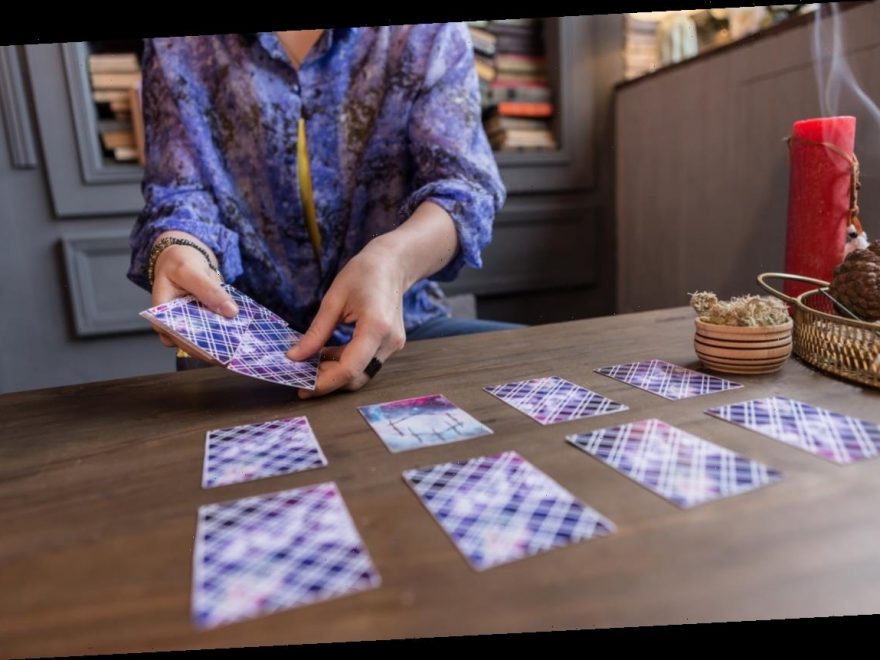I spent a good many sleepovers flipping through tarot cards without really connecting to what I was seeing. As much fun as it was to worry my friends with ridiculous interpretations of the deck, I never felt a personal connection to the colorful cards I was flipping over. I’ve since learned that there are actually alternatives to the prescribed tarot deck. If you’re over the standard deck you’ve been seeing on Instagram, there are more unique, personalized decks out there, similar to tarot, called oracle decks. The difference between oracle and tarot cards may seem subtle, but it could make a big impact.
You may already know how tarot cards work — or at least, what they are. A tarot deck is a classic set of 78 cards that fall under the category of major or minor arcana. From there, the cards are divided into four suits (Wands, Cups, Swords, and Pentacles). Tarot cards are studied and interpreted by expert readers, primarily to speak to a person’s life story.
Oracle cards, on the other hand, are more free-wheeling from the set structure of tarot. An oracle deck can essentially be whatever the creator of the deck wants it to be — they pick how many cards are in it, what sorts of imagery it’ll use, and what purpose it’s supposed to serve. There are many different types of oracle decks that come in all shapes, sizes, and functions. The basic set-up is that they have images and words, along with a book that explains ways in which a reader should interpret them.
To understand oracle decks better, I spoke to Aarona Lea Pichinson, the author and co-creator of the Moon Deck, which is an oracle deck that’s supposed "to help ritualize the path to self-love," Pichinson says.
Because tarot takes time to study and is a more rigidly set deck, Pichinson says, oracle decks could be "maybe more accessible for more people." Oracle cards can be a variety of things, from affirmations to work with the elements to spiritual guides. Each card in the Moon Deck, for instance, has a write-up and ritual attached to it, so it prompts actions and accountability "to participate in [a reader’s] own development and healing." What the flexibility of oracle cards means, she says, is that more creative people are getting into the making and reading of oracle decks, "where you can really bring a fusion of one’s teachings on a personal development and spiritual path into something visual, digestible, and experiential."
Pichinson explains that oracle cards are like tarot in that they are "directive tools," so they offer guidance, clarity, and a new perspective — often pointing you toward something you already knew, but needed an outside vision on. "It’s helped me to get a little more clear and connected to an answer I’m seeking and remembering that the answers are in me, and these cards really help direct that," she says.
Although anyone can make their own oracle deck, it does take a lot of time and dedication to put it all together. Unlike the tarot deck, you need to create your very own cards and meanings. "It’s an intense process," Pichinson says, adding that it took her and the team a few years. She began ideating around 2010, and spent a few years collecting notes and researching as she wrote the language for the cards. Pichinson eventually asked her friend, Andrea Keh, to be the deck’s illustrator. From there, she had to think about what the deck would be, and she decided she wanted her deck to be feminine, about the moon, and ritual-based.
Pichinson adds that if you want to make your own oracle deck, you should "start before you think you’re ready." The Moon Deck didn’t happen overnight: It took years of thinking, learning, writing down notes, and then doing the work of writing and making the art for the cards. "For me, it was a survival, that became a passion, that then became a profession," Pichinson says about her journey with cards. So if you never really felt tarot cards, there’s a whole oracle world out there waiting for you to explore.
This article was originally published on
Source: Read Full Article
